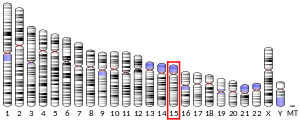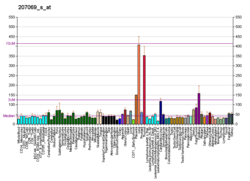Mothers_against_decapentaplegic_homolog_6
Mothers against decapentaplegic homolog 6
Protein-coding gene in the species Homo sapiens
SMAD family member 6, also known as SMAD6, is a protein that in humans is encoded by the SMAD6 gene.[5]
SMAD6 is a protein that, as its name describes, is a homolog of the Drosophila gene "mothers against decapentaplegic". It belongs to the SMAD family of proteins, which belong to the TGFβ superfamily of modulators. Like many other TGFβ family members SMAD6 is involved in cell signalling. It acts as a regulator of TGFβ family (such as bone morphogenetic proteins) activity by competing with SMAD4 and preventing the transcription of SMAD4's gene products. There are two known isoforms of this protein.
The SMAD proteins are homologs of both the drosophila protein, mothers against decapentaplegic (MAD) and the C. elegans protein SMA. The name is a combination of the two. During Drosophila research, it was found that a mutation in the gene MAD in the mother repressed the gene decapentaplegic in the embryo. The phrase "Mothers against" was added as a humorous take-off on organizations opposing various issues e.g., Mothers Against Drunk Driving, or MADD; and based on a tradition of such unusual naming within the gene research community.[6]
Heterozygous, damaging mutations in SMAD6 are the most frequent genetic cause of non-syndromic craniosynostosis identified to date.[7]
Mothers against decapentaplegic homolog 6 has been shown to interact with:
- "Human PubMed Reference:". National Center for Biotechnology Information, U.S. National Library of Medicine.
- "Mouse PubMed Reference:". National Center for Biotechnology Information, U.S. National Library of Medicine.
- "Sonic Hedgehog, DICER, and the Problem With Naming Genes", Sep 26, 2014, Michael White. psmag.com
- Timberlake AT, Choi J, Zaidi S, Lu Q, Nelson-Williams C, Brooks ED, et al. (September 2016). "BMP2 alleles". eLife. 5. doi:10.7554/eLife.20125. PMC 5045293. PMID 27606499.
- Bai S, Shi X, Yang X, Cao X (March 2000). "Smad6 as a transcriptional corepressor". J. Biol. Chem. 275 (12): 8267–70. doi:10.1074/jbc.275.12.8267. PMID 10722652.
- Kimura N, Matsuo R, Shibuya H, Nakashima K, Taga T (June 2000). "BMP2-induced apoptosis is mediated by activation of the TAK1-p38 kinase pathway that is negatively regulated by Smad6". J. Biol. Chem. 275 (23): 17647–52. doi:10.1074/jbc.M908622199. PMID 10748100.
- Yanagisawa M, Nakashima K, Takeda K, Ochiai W, Takizawa T, Ueno M, Takizawa M, Shibuya H, Taga T (December 2001). "Inhibition of BMP2-induced, TAK1 kinase-mediated neurite outgrowth by Smad6 and Smad7". Genes Cells. 6 (12): 1091–9. doi:10.1046/j.1365-2443.2001.00483.x. PMID 11737269. S2CID 25476125.
- Topper JN, Cai J, Qiu Y, Anderson KR, Xu YY, Deeds JD, Feeley R, Gimeno CJ, Woolf EA, Tayber O, Mays GG, Sampson BA, Schoen FJ, Gimbrone MA, Falb D (August 1997). "Vascular MADs: two novel MAD-related genes selectively inducible by flow in human vascular endothelium". Proc. Natl. Acad. Sci. U.S.A. 94 (17): 9314–9. Bibcode:1997PNAS...94.9314T. doi:10.1073/pnas.94.17.9314. PMC 23174. PMID 9256479.
- Imoto S, Sugiyama K, Muromoto R, Sato N, Yamamoto T, Matsuda T (September 2003). "Regulation of transforming growth factor-beta signaling by protein inhibitor of activated STAT, PIASy through Smad3". J. Biol. Chem. 278 (36): 34253–8. doi:10.1074/jbc.M304961200. hdl:2115/28123. PMID 12815042.
- Datta PK, Moses HL (May 2000). "STRAP and Smad7 synergize in the inhibition of transforming growth factor beta signaling". Mol. Cell. Biol. 20 (9): 3157–67. doi:10.1128/MCB.20.9.3157-3167.2000. PMC 85610. PMID 10757800.
- Massagué J (1998). "TGF-beta signal transduction". Annu. Rev. Biochem. 67: 753–91. doi:10.1146/annurev.biochem.67.1.753. PMID 9759503.
- Verschueren K, Huylebroeck D (2000). "Remarkable versatility of Smad proteins in the nucleus of transforming growth factor-beta activated cells". Cytokine Growth Factor Rev. 10 (3–4): 187–99. doi:10.1016/S1359-6101(99)00012-X. PMID 10647776.
- Wrana JL, Attisano L (2000). "The Smad pathway". Cytokine Growth Factor Rev. 11 (1–2): 5–13. doi:10.1016/S1359-6101(99)00024-6. PMID 10708948.
- Miyazono K (2000). "TGF-beta signaling by Smad proteins". Cytokine Growth Factor Rev. 11 (1–2): 15–22. doi:10.1016/S1359-6101(99)00025-8. PMID 10708949.
- Riggins GJ, Thiagalingam S, Rozenblum E, Weinstein CL, Kern SE, Hamilton SR, Willson JK, Markowitz SD, Kinzler KW, Vogelstein B (1996). "Mad-related genes in the human". Nat. Genet. 13 (3): 347–9. doi:10.1038/ng0796-347. PMID 8673135. S2CID 10124489.
- Topper JN, Cai J, Qiu Y, Anderson KR, Xu YY, Deeds JD, Feeley R, Gimeno CJ, Woolf EA, Tayber O, Mays GG, Sampson BA, Schoen FJ, Gimbrone MA, Falb D (1997). "Vascular MADs: Two novel MAD-related genes selectively inducible by flow in human vascular endothelium". Proc. Natl. Acad. Sci. U.S.A. 94 (17): 9314–9. Bibcode:1997PNAS...94.9314T. doi:10.1073/pnas.94.17.9314. PMC 23174. PMID 9256479.
- Hata A, Lagna G, Massagué J, Hemmati-Brivanlou A (1998). "Smad6 inhibits BMP/Smad1 signaling by specifically competing with the Smad4 tumor suppressor". Genes Dev. 12 (2): 186–97. doi:10.1101/gad.12.2.186. PMC 316444. PMID 9436979.
- Afrakhte M, Morén A, Jossan S, Itoh S, Sampath K, Westermark B, Heldin CH, Heldin NE, ten Dijke P (1998). "Induction of inhibitory Smad6 and Smad7 mRNA by TGF-beta family members". Biochem. Biophys. Res. Commun. 249 (2): 505–11. doi:10.1006/bbrc.1998.9170. PMID 9712726.
- Galvin KM, Donovan MJ, Lynch CA, Meyer RI, Paul RJ, Lorenz JN, Fairchild-Huntress V, Dixon KL, Dunmore JH, Gimbrone MA, Falb D, Huszar D (2000). "A role for smad6 in development and homeostasis of the cardiovascular system". Nat. Genet. 24 (2): 171–4. doi:10.1038/72835. PMID 10655064. S2CID 24365746.
- Bai S, Shi X, Yang X, Cao X (2000). "Smad6 as a transcriptional corepressor". J. Biol. Chem. 275 (12): 8267–70. doi:10.1074/jbc.275.12.8267. PMID 10722652.
- Kimura N, Matsuo R, Shibuya H, Nakashima K, Taga T (2000). "BMP2-induced apoptosis is mediated by activation of the TAK1-p38 kinase pathway that is negatively regulated by Smad6". J. Biol. Chem. 275 (23): 17647–52. doi:10.1074/jbc.M908622199. PMID 10748100.
- Datta PK, Moses HL (2000). "STRAP and Smad7 Synergize in the Inhibition of Transforming Growth Factor β Signaling". Mol. Cell. Biol. 20 (9): 3157–67. doi:10.1128/MCB.20.9.3157-3167.2000. PMC 85610. PMID 10757800.
- Ebisawa T, Fukuchi M, Murakami G, Chiba T, Tanaka K, Imamura T, Miyazono K (2001). "Smurf1 interacts with transforming growth factor-beta type I receptor through Smad7 and induces receptor degradation". J. Biol. Chem. 276 (16): 12477–80. doi:10.1074/jbc.C100008200. PMID 11278251.
- Itoh F, Asao H, Sugamura K, Heldin CH, ten Dijke P, Itoh S (2001). "Promoting bone morphogenetic protein signaling through negative regulation of inhibitory Smads". EMBO J. 20 (15): 4132–42. doi:10.1093/emboj/20.15.4132. PMC 149146. PMID 11483516.
- Yanagisawa M, Nakashima K, Takeda K, Ochiai W, Takizawa T, Ueno M, Takizawa M, Shibuya H, Taga T (2002). "Inhibition of BMP2-induced, TAK1 kinase-mediated neurite outgrowth by Smad6 and Smad7". Genes Cells. 6 (12): 1091–9. doi:10.1046/j.1365-2443.2001.00483.x. PMID 11737269. S2CID 25476125.
- Schiffer M, Schiffer LE, Gupta A, Shaw AS, Roberts IS, Mundel P, Böttinger EP (2003). "Inhibitory smads and tgf-Beta signaling in glomerular cells". J. Am. Soc. Nephrol. 13 (11): 2657–66. doi:10.1097/01.ASN.0000033276.06451.50. PMID 12397035.
This article on a gene on human chromosome 15 is a stub. You can help Wikipedia by expanding it. |
This molecular or cell biology article is a stub. You can help Wikipedia by expanding it. |





